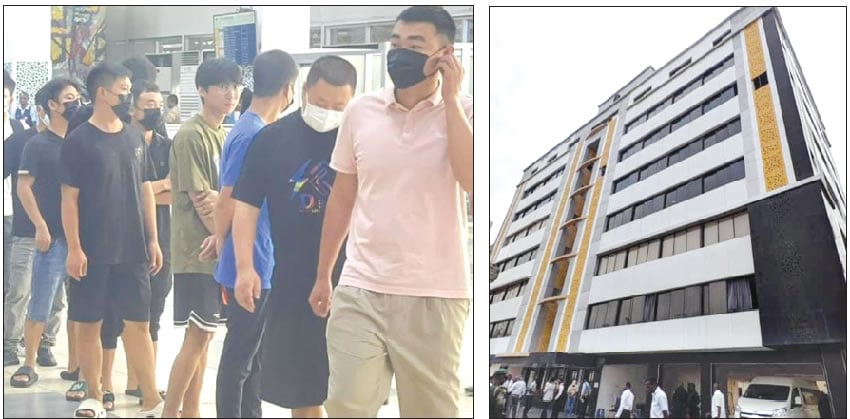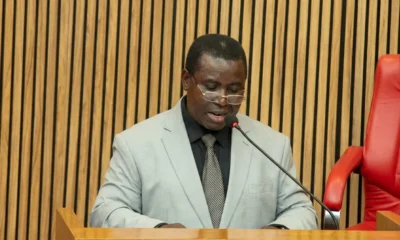News
Inside Nigeria’s online fraud rings run by foreign ex-convicts

In this report, GBENGA OLONINIRAN details how foreign ex-convicts flee their home countries, set up fraud syndicates in Nigeria, and lure vulnerable youths into online scams
At first glance, the seven-storey facility known as Big Leaf Building at No. 7, Oyin Jolayemi Street, Victoria Island, Lagos, could easily pass for the corporate headquarters of a major financial institution.
Exotic cars fill the compound, and every floor brims with high-end desktop computers, the kind designed for top-tier digital operations.
The managers are foreigners — Chinese, Filipinos, Eastern Europeans, and Tunisians.
With over 600 employees and a N250,000 entry salary, it is the dream workplace for many a young Nigerian.
However, unlike most firms, the “company” never advertises vacancies. Recruitment happens through referrals, old employees secretly head-hunt new ones.
To be hired, an applicant must be computer-literate and fast at typing. The interview process is handled by the foreign bosses, but with a curious twist: no job title, no contract, and no official explanation of duties. Candidates are expected to already know “how things work” from whoever referred them.
Once inside, the truth unfolds. New recruits join a hall of young Nigerians stationed before desktop computers and smartphones. Their foreign superiors create fake online profiles for them and provide “logs” granting access to foreign phone numbers and messaging platforms.
The task is simple: target foreign victims, mostly Americans, Canadians, Mexicans, and Europeans, through WhatsApp, Instagram, and Telegram.
You engage them in chats via WhatsApp, Instagram and Telegram. Each conversation, whether romantic, friendly, or business-related, is a step toward a con.
“A job that became a trap”
For Gbolahan Adegbayi, a 2022 Computer Science graduate, the job offer seemed like a dream. After two years of job hunting, he thought he had finally found his breakthrough.
“When I heard it was a Chinese-owned company operating in Victoria Island, I thought my life was about to change,” he told our reporter during a chat.
Eager to begin, Gbolahan left Ibadan for Lagos, moving in with a relative in Victoria Island. But within days of resuming, he realised he had been recruited into a Yahoo Yahoo gang, one controlled by foreigners.
“I was barely two weeks into the job when I started suspecting something was wrong,” he recounted. “A lot was hidden. There was no contract or proper communication. You’re just told what to do daily — chatting with different foreigners under fake accounts.”
According to him, the foreigners gave all instructions and closely monitored the activities of Nigerian recruits.
The bust
In December 2024, the Economic and Financial Crimes Commission busted the facilities. According to the commission, many of the foreigners are ex-convicts who escaped from their countries of origin, with some having no valid visas.
Speaking during a briefing at the Lagos Zonal Office, the Director, Public Affairs, EFCC, Wilson Uwujaren, said the Nigerian accomplices are usually assigned WhatsApp accounts linked to foreign telephone numbers, especially from Germany and Italy.
“They engage victims in romantic conversations as well as phantom business and investment discussions to trick them into shopping on a purported online investment shopping platform called www.yooto.com,” Uwujaren said.
Hotel review scam
One of the tactics also deployed by the foreigners is swindling their targets through fake hotel reviews.
A group of foreigners and their Nigerian accomplices were detected in Abuja, the Federal Capital Territory, on January 9, 2025, specialising in hotel review job scam, targeting mostly United Kingdom victims.
Over 100 Nigerian youths had also fallen victim to the fraudulent jobs offered by the foreign syndicate comprising just four Chinese and took cover at Naka Hall Plaza in Abutu Garba Street, Gudu, Abuja.
Possessing highly efficient work stations, the Chinese recruited 101 computer-savvy Nigerians as customer service representatives.
The representatives are made to work on a prepared template online. They are given identities and names, usually foreign, through which they chat with expatriates.
The EFCC chairman, Ola Olukoyede, while detailing the criminal activities of the group, said, “The crime involves making false representations to victims to win their trust to engage in hotel ratings with promises of $5 for every hotel that is reviewed.
“As the victims get paid, they are encouraged to review more hotels and the payment is increased to $10 per rating. After a long while, the victim is encouraged to make bookings in any of the rated hotels for as much as $500 and the company would pay back with chunky interest into a crypto wallet bearing their names. After making bookings, the victim would not be able to open the wallet and his or her money is lost.
“The fraud is an intricate mechanism of defrauding foreigners and it is targeted at victims in Europe and other parts of the world.”
He stated that 100 compact workstations were recovered from the suspects, and according to him, the Abuja suspects were busted barely a month after the 792 fraudsters were arrested in Lagos.
He added, “Another thing that we discovered is that some of the foreigners we arrested were already ex-convicts in their countries. Some of them have been convicted and escaped from their countries and found safe haven in Africa, not only Nigeria. We discovered that they are also developing cells in some other African countries by virtue of the investigation we are carrying out.”
Between December 2024 and August 2025, the EFCC arrested 192 foreigners engaging in cyber fraud in Lagos alone.
The commission gave the nationalities of those arrested in the Big Leaf Building as 148 Chinese, 40 Filipinos, two Khazarians, one Pakistani, and one Indonesian. Altogether, a total of 792 suspects were arrested, with Nigerian accomplices being the majority.
In May 2025, 11 Filipinos, two Chinese, one Malaysian and one Indonesian were sentenced to one-year imprisonment each for cyber-terrorism and Internet fraud before justices Yellim Bogoro and A. O. Owoeye of the Federal High Court sitting in Ikoyi, Lagos.
They all pleaded “guilty” to the charges preferred against them and were sentenced to one-year imprisonment each, with a fine of N1m.
As of October 2025, 192 foreigners had been convicted and deported to their respective countries, with the final batch of 51 convicts repatriated on October 16, 2025.
Our correspondent sent emails to the embassies of China and the Philippines in Nigeria, requesting their official reaction, but no response was received as of the time of filing this report.
EFCC speaks
The EFCC spokesperson, Dele Oyewale, in an interview with our correspondent, explained that Nigerians are not all behind Internet fraud but have become victims of criminal stigmatisation across the globe.
He said, “Many of them are Chinese, Filipinos, and Tunisians. The lesson is that Nigerians are not all behind Internet fraud; there are foreign instigators. Foreign perpetrators are giving the dog a bad name to hang it. They are the masterminds and brains behind cyberterrorism and Internet fraud. So what we uncovered is that they are recruiting locals, giving them the impression that they have landed lucrative jobs. They pay them as high as N250,000 monthly and they do not tell them their job specifications. They give them the scripts to follow.”
According to Oyewale, the foreigners do not give the Nigerian recruits letters of employment. “No terms of engagement, no working culture, and they are feeding on the fact that there is so much vulnerability in the country because of the state of our economy. They employ them, give them computers and tell them what to do, and what they are doing is recruit them as Internet fraud actors. They teach them how to hack into foreign businesses, coach victims and give them assurance about goods they cannot deliver to get money from them. They engage in all sorts of Internet impersonations in order to defraud their victims.”
Expired visas
When contacted for an explanation on how the foreign actors were entering the country only to perpetrate crimes, the Nigerian Immigration Service said its job was simply to deport the convicted ones, which it had done.
“We have done our part. They (the EFCC) have handed them over to us, and we made sure that those convicted were returned to their countries,” the NIS Spokesman, AS Akinlabi, told The PUNCH.
However, a top official in the Immigration, in charge of visas, who asked not to be named, said it was certain that some of the culprits entered Nigeria with valid visas, only to engage in criminal activities afterward.
The official said, “By the time they entered, they had valid visas, so it’s not possible for them to enter the country without a valid visa. It’s a common thing; it’s possible they enter for one purpose and carry out another thing when they get here. I think that’s why they were arrested in the first place. Even if Nigerians travel to the United Kingdom and America to do something else (like crime), if they are caught, they will be deported because they have violated the terms of their visas.
“You don’t really know what’s in the minds of human beings. We have a lot of Chinese in the country doing a lot of legitimate projects for registered Chinese companies. It’s possible that those ones (who were convicted) entered for tourism, for instance, and they refuse to leave, but the good thing is that authorities are working together to ensure that such persons are deported.”
According to him, visas of some of the foreign nationals had expired and they were overstaying in Nigeria.
Unemployment, growing Internet fraud
According to the National Bureau of Statistics, Nigeria’s youth unemployment rate (ages 15–24) in the second quarter of 2024 stood at 6.5 per cent. This was, however, a significant drop compared to 8.4 per cent in Q1 2024.
Amid the unemployment crisis, many youths continue to engage in Internet fraud despite a series of arrests made by the EFCC.
Last December, Facebook’s parent company, Meta, lamented an increasing trend of financial sextortion on its platforms.
It said the borderless crime was being fueled in recent years by the increased activity of “Yahoo Boys,” operating largely out of Nigeria, but could not provide details of their nationalities.
In Meta’s report published in July 2024, seen by our correspondent, Meta said it removed around 63,000 Instagram accounts in Nigeria attempting to target people with financial sextortion scams, including a coordinated network of around 2,500 accounts.
It noted that the scammers were also trying to recruit others. “We’ve also removed a set of Facebook accounts, pages and groups run by Yahoo Boys – banned under our Dangerous Organisations and Individuals policy – that were attempting to organise, recruit and train new scammers.”
Experts speaks
A Cybersecurity Expert in England, United Kingdom, Abdulazeez Abdulkadir, believes that the foreign actors are exploiting a mix of weaknesses in the system that make Nigeria attractive to fraud activities.
Abdulkadir said, “Foreign actors are exploiting gaps in SIM card registration, the lax enforcement of immigration and work permits, and the poor oversight of office spaces where large-scale scam operations can operate almost like call centres.
“On top of that, our Internet services often rely on shared or dynamic IP addresses. Without proper logging by service providers, it becomes harder to trace the individuals behind certain online activities. So, what these syndicates are really exploiting is not the Internet itself, but the weak regulatory and enforcement environment around how telecoms and online services are managed. That combination (regulatory gaps, cheap operating costs, and the existing stereotype around Nigeria and cybercrime) makes it easier for them to set up here and hide their activities under the cover of local involvement.”
He believes that the Nigerian stereotype for cybercrime on the international stage has links to the works of foreign syndicates.
“There is clear evidence that organised international syndicates are heavily involved. The recent arrests showed that many of the masterminds were foreign nationals, and they were the ones recruiting and training Nigerians to act as the first point of contact with victims. What this tells us is that Nigeria is often being used as an operational base by global networks, who understand how to exploit the environment to mask their operations.”
Noting that Nigeria already had the Cybercrime Act and other policies, Abdulkadir recommended stricter SIM registration and verification, including tougher rules for crypto exchanges and payment platforms.
“Cybercrime is borderless, so Nigeria needs stronger agreements with other countries and global tech firms to track and shut down these networks quickly. If these measures are enforced, Nigeria would become a much harder place for syndicates to exploit, and at the same time, we would begin to rebuild our image on the international stage,” he added.
A Cybersecurity Researcher at King’s College, London, Jerahmeel Madumere, said he doesn’t think Nigeria has a weak Internet loophole that made it attractive to foreign actors, but rather systemic and contextual vulnerabilities.
“We already have a global reputation linked to Internet fraud. The same applies to countries like India, Russia, Cambodia and the Philippines. Foreign actors exploit this stigma to hide behind Nigerian identities, making it harder to trace them internationally,” Madumere told The PUNCH.
He identified the digital literacy gap as another major issue, noting that many young Nigerians with basic computer skills but limited job opportunities could be easily recruited and trained to execute low-level cybercrime tasks.
Madumere said, “Nigeria also lacks cross-border policing, which creates weak collaboration between Nigerian and foreign cybercrime units, allowing international actors to operate from Nigerian soil without quick detection. Nigeria doesn’t necessarily lack laws to address this issue; it has cybercrime laws (prohibition, prevention, etc.). Act 2015, but enforcement and modernisation are the main issues. They should focus on strengthening SIM & device registration controls, enforcing stricter telecom Know Your Customer, limiting bulk SIM purchases, and mandating biometric re-verification.”
He also advised mandatory reporting and oversight for digital platforms. “Compel ISPs, hosting providers, and fintech platforms to report suspicious activities and cooperate with the EFCC investigations. Train more local cyber forensic experts and create cybercrime courts for faster prosecution.”
He advised further that there should be cross-border intelligence sharing by formalising partnerships with Europol, Interpol, and North American cyber units for real-time intelligence exchange, as we fall behind in those areas of expertise.”
NCC reacts
When contacted, the Head of Public Affairs, Nigerian Communications Commission, Nnena Ukoha, said the commission is addressing cybersecurity challenges, noting that challenges around Over-the-Top services are a global phenomenon and not peculiar to Nigeria.
She said “most of these syndicates are merely relying on the availability of good internet connectivity and resources, both of which are present in Nigeria, with the 4G/5G coverage in most urban centres and over 165 million lines. Therefore, the notion that a weak regulatory framework is responsible is not true.”
Ukoha said, “The Commission has put in place several safeguards like the SIM registration guideline to ensure that all SIM cards in Nigeria can be traced to their registered users and the NIN-SIM linkage to also add another layer of security.
“We are also currently putting in place a Telecom Identity Risk Management Solution Portal where Mobile Network Operators will be automatically updating their churned (recycled) numbers so that it will be communicated to banks, OTTs and other service providers linked to Nigerian phone numbers to dissociate these numbers from their services. The Commission is actively engaging all major OTT players on these issues. We have also developed a Cybersecurity Resilience Framework for the Communications Sector, which will help address the wider cybersecurity challenges across the industry.”
The rise of foreign-led fraud rings in the country appears to expose a troubling nexus of global crime and local desperation, particularly among vulnerable Nigerian youths.(Punch)
-

 Politics9 hours ago
Politics9 hours agoFintiri Set To Defect As Speaker, 13 Assembly Members Dump PDP
-

 News9 hours ago
News9 hours agoContinue With What We’ve Been Doing Together – Egbetokun Tells Successor
-

 News9 hours ago
News9 hours agoDSS Releases Walida
-

 News9 hours ago
News9 hours agoDisu declares total war on police corruption, impunity
-

 News9 hours ago
News9 hours agoWage arrears: Labour issues Friday ultimatum to FG
-

 Business6 hours ago
Business6 hours agoNigerian-American billionaire Adebayo Ogunlesi bids for Eni stake in Nigeria’s Renaissance JV
-

 News8 hours ago
News8 hours agoBoko Haram Attack Adamawa Communities Claims Life Of Village Head, 17 Others
-

 Politics7 hours ago
Politics7 hours agoINEC reviews timetable, APC consolidates as 2027 race begins


















